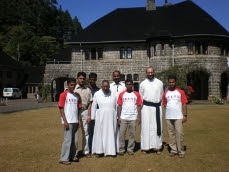(A continuation of the previous post)
That night, however, had not been just a miraculous escape from the army of the enemies. The Virgin had made him free from the chains that imprisoned his soul.
Saint Jerome, as we came to know him nowadays, became one of the actors of the Catholic Reformation, along with other great saints like St. Ignatius of Loyola, St. Francis Xavier, St. Cajetan of Thiene, St. Anthony Mary Zaccaria, and also Pope Paul IV (who, as a Bishop, had been St. Jerome's spiritual director), and some others. He shared a spiritual friendship with a few of them.
His liberation turned out to be freedom for many other people.
He came in contact with the Brotherhood of Divine Love, a forge of saints. Their first aim was the reformation of their members. He expressed his commitment by serving – along with the other brothers – people affected by incurable diseases: the marginalised of his time. The bodily chains of those sick people could merely be alleviated, but the ones of their soul were broken.
He desired a reformed Church, resplendent with sanctity; liberated, in fact, by the worldly ties to which several if her members fettered her.
His thirst for a renewed Christianity on the pattern of the early community of Jerusalem was positively contagious. He, a lay man, became a guide and reference person to numerous lay people and priests: the Company of the Servants of the Poor, later recognised and approved by St. Pius V under the name of Clerics Regular of Somasca (Somasca being the village where St. Jerome lived the last period of his life and eventually died). His companions found their own freedom in the footsteps of his.
He had been an orphan from a very young age. Hence he immediately noticed other chains to be broken: children who, having lost their parents in wars and famines, wondered in the streets of Venice, living by one's wits. He took them with himself; he became their Dad. With them he formed a sketch of reformed Church that attracted the attention of the people around, touched their heart, changed their life. This work developed into his and his companions' main field of expertise, and he spread it everywhere Bishops called him.
The Protestant heresy was gaining ground. St. Jerome went to the countryside and, with the help of his children, offered instruction about the Faith, which was most often dormant and unaware.
He died of plague on February 8th, 1537, the day we now observe as his liturgical memorial. His life had been spent to break chains and share with others the freedom he had received.
His companions, now known as Somascan Fathers and later flanked by a few women's congregations, have continued his work of liberation until our present time, in several areas of the world. Chains of various kinds and places continued to be shattered: oppression, ignorance, loneliness, poverty, marginalisation, violence, drug addiction, illness. Above all, the beauty and truth of our Faith made innumerable people free from the slavery of sin and falsehood.
September 27th, 2011, will bring us the fifth centenary of the liberation of St. Jerome Miani at the hands of the Madonna. Five hundred years of freedom: a milestone worthy of celebration.
The Holy Father Benedict XVI send a message in which he recognises love as the most important feature of the work of St. Jerome, and points it out as an urgent need of our time.
The Superior General of the Somascan Fathers inaugurated the jubilee year on September 25th, 2011, in the same place where St. Jerome's liberation was first made known: the Shrina of the Great Madonna of Treviso. Psalm 116 offer the central theme of the year: “You have broken my chains”. Various events will follow in the course of the year.
St. Jerome's quest for reformation and Christian authenticity has crossed the centuries. Today, in the appeal of Pope Benedict to fight the dictatorship of relativism, we cannot fail to recognise new mighty chains to be broken, for an even more beautiful Church, more faithful to her mission. There is no lack of work. Five hundred years of freedom and it's not over, yet.




